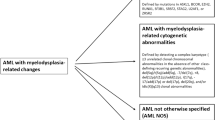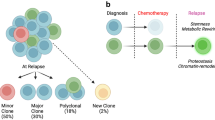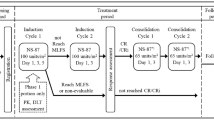Abstract
A multicenter, prospective, randomized study was conducted to compare a response-oriented individualized remission induction therapy with a standard fixed-schedule induction therapy, using idarubicin (IDR) and cytarabine (Ara-C), in adult patients with acute myeloid leukemia (AML). Newly diagnosed patients with AML of age less than 65 were randomly assigned to receive either of the two schedules. Both groups received IDR (12 mg/m2) for 3 days and Ara-C (100 mg/m2) for 7 days. In the individualized group, if the bone marrow on day 8 did not become hypocellular with less than 15% blasts, patients received additional IDR for one more day and Ara-C for 2 or 3 more days. Patients achieving complete remission (CR) received the same post-remission therapy. The CR rate was 79.4% for the individualized group (n = 209) and 81.9% for the fixed group (n = 221) (p = 0.598). At a median follow-up of 81 months, 7-year predicted overall survival was 37% for the individualized group and 39% for the fixed group (p = 0.496), and 7-year predicted event-free survival was 22% for the individualized group and 23% for the fixed group (p = 0.546). Thus, the present study could not demonstrate any advantage of a response-oriented individualized induction therapy over a fixed-schedule induction therapy in this protocol setting.



Similar content being viewed by others
References
Uzuka Y, Liong SK, Yamagata S. Treatment of adult acute non-lymphoblastic leukemia using intermittent combination chemotherapy with daunomycin, cytosine arabinoside, 6-mercaptopurine and prednisolone-DCMP two step therapy. Tohoku J Exp Med. 1976;118(Suppl):217–25.
Cooperative Study Group on Leukemia and Allied Diseases. DCMP two-step therapy for acute myelogenous leukemia in adults. Jpn J Clin Oncol. 1978;8:133–40.
Ohno R, Kato Y, Nagura E, Murase T, Okumura M, Yamada H, et al. Behenoyl cytosine arabinoside, daunorubicin, 6-mercaptopurine, and prednisolone combination therapy for acute myelogenous leukemia in adults and prognostic factors related to remission duration and survival length. J Clin Oncol. 1986;4:1740–7.
Ohno R, Kobayashi T, Tanimoto M, Hiraoka A, Imai K, Asou N, et al. Randomized study of individualized induction therapy with or without vincristine, and of maintenance-intensification therapy between 4 or 12 courses in adult acute myeloid leukemia. AML-87 Study of the Japan Adult Leukemia Study Group. Cancer. 1993;71:3888–95.
Kobayashi T, Miyawaki S, Tanimoto M, Kuriyama K, Murakami H, Yoshida M, et al. Randomized trials between behenoyl cytarabine and cytarabine in combination induction and cytarabine in combination induction and consolidation therapy, and with or without ubenimex after maintenance/intensification therapy in adult acute myeloid leukemia. J Clin Oncol. 1996;14:204–13.
Miyawaki S, Tanimoto M, Kobayashi T, Minami S, Tamura J, Omoto E, et al. No beneficial effect from addition of etoposide to daunorubicin, cytarabine, and 6-mercaptopurine in individualized induction therapy of adult acute myeloid leukemia: the JALSG-AML92 study. Int J Hematol. 1999;70:97–104.
Ohno Ryuzo. How high can we increase complete remission rate in adult acute myeloid leukemia? Int J Hematol. 2000;72:272–9.
Berman E, Heller G, Santorsa J, McKenzie S, Gee T, Kempin S, et al. Results of a randomized trial comparing idarubicin and cytosine arabinoside with daunorubicin and cytosine arabinoside in adult patients with newly diagnosed acute myelogenous leukemia. Blood. 1991;77:1666–74.
Vogler WR, Velez-Garcia E, Weiner RS, Flaum MA, Bartolucci AA, Omura GA, et al. A phase III trial comparing idarubicin and daunorubicin in comparison with cytarabine in acute myelogenous leukemia: a Southeastern Cancer Study Group Study. J Clin Onocol. 1992;10:1103–11.
Wiernik PH, Banks PL, Case DC Jr, Arlin ZA, Periman PO, Todd MB, et al. Cytarabine plus idarubicin or daunorubicin as induction and consolidation therapy for previously untreated adult patients with acute myeloid leukemia. Blood. 1992;79:313–9.
Grimwade D, Walker H, Oliver F, Wheatley K, Harrison C, Harrison G, et al. The importance of diagnostic cytogenetics on outcome in AML: analysis of 1,612 patients entered into the MRC AML 10 trial. Blood. 1998;92:2322–33.
Usui N, Dobashi N, Kobayashi T, Yano S, Maki N, Asai O, et al. Role of daunorubicin in the induction therapy for adult acute myeloid leukemia. J Clin Oncol. 1998;16:2086–92.
Sanz MA, Martín G, Rayón C, Esteve J, González M, Díaz-Mediavilla J, et al. A modified AIDA protocol with anthracycline-based consolidation results in high antileukemic efficacy and reduced toxicity in newly diagnosed PML/RARalpha-positive acute promyelocytic leukemia. PETHEMA group. Blood. 1999;94:3015–21.
Asou N, Kishimoto Y, Kiyoi H, Okada M, Kawai Y, Tsuzuki M, et al. A randomized study with or without intensified maintenance chemotherapy in patients with acute promyelocytic leukemia who have become negative for PML-RARalpha transcript after consolidation therapy: the Japan Adult Leukemia Study Group (JALSG) APL97 study. Blood. 2007;110:59–66.
Druker BJ, Guilhot F, O’Brien SG, Gathmann I, Kantarjian H, Gattermann N, et al. Five-year follow-up of patients receiving imatinib for chronic myeloid leukemia. N Engl J Med. 2006;355:2408–17.
Yanada M, Takeuchi J, Sugiura I, Akiyama H, Usui N, Yagasaki F, et al. High complete remission rate and promising outcome by combination of imatinib and chemotherapy for newly diagnosed BCR-ABL-positive acute lymphoblastic leukemia: a phase II study by the Japan Adult Leukemia Study Group. J Clin Oncol. 2006;24:460–6.
Acknowledgments
We thank all participating physicians from the 79 institutions in the JALSG for their cooperation. This study was supported in part by a grant from the Ministry of Health, Labor, and Welfare of Japan.
Author information
Authors and Affiliations
Corresponding author
Additional information
For the Japan Adult Leukemia Study Group (JALSG).
About this article
Cite this article
Ohtake, S., Miyawaki, S., Kiyoi, H. et al. Randomized trial of response-oriented individualized versus fixed-schedule induction chemotherapy with idarubicin and cytarabine in adult acute myeloid leukemia: the JALSG AML95 study. Int J Hematol 91, 276–283 (2010). https://doi.org/10.1007/s12185-009-0480-5
Received:
Revised:
Accepted:
Published:
Issue Date:
DOI: https://doi.org/10.1007/s12185-009-0480-5




